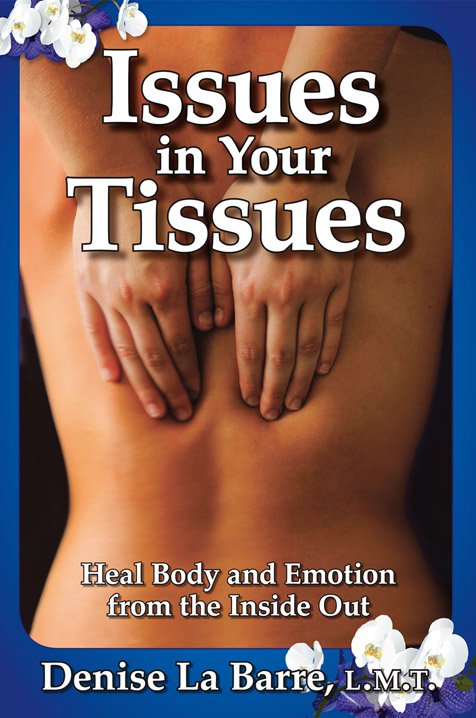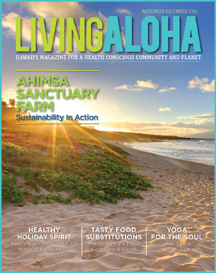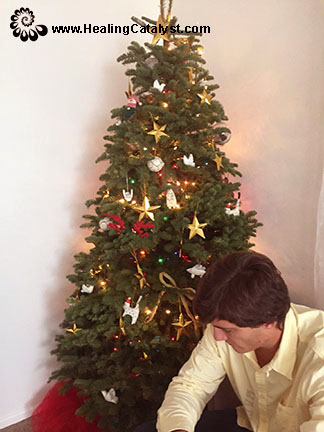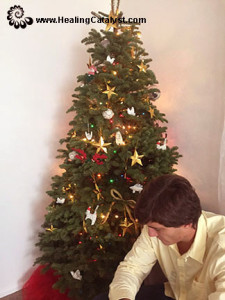‘Tis the Season – A Case for a Gentler Approach
As you Welcome Holiday Sadness, it Transforms
Holiday sadness hits can hit anyone during the winter and that’s a good thing. Here’s how to welcome it for a better season.
‘Tis the season to be jolly,” says the famous Christmas carol, written before electric lights pushed away the lean darkness of winter. The thoughtful gatherings that broke up the long winter nights have become a non-stop ride of excessive shopping, overdoing, and overeating. Stores display Christmas decorations even before Halloween. The media push us to buy “the perfect gift” and prepare “the perfect meal.” This can be crazy-making – especially when our circadian rhythms tell us to be quiet, contemplative and sleepy. We can get depressed when our circumstances don’t measure up to the artificial glitz and glitter.
A period of slow, digestive inactivity is built-in to the natural cycles that nourish and sustain us – if we move with them. Plants and animals slow their growth, or hibernate in winter. They are wisely conserving energy as the sun’s light and warmth are less available to refuel them, food is naturally scarce, and nights are long. We humans are meant to rest in winter, too. Because of all the media hype and pumped expectation, you may feel like you’ve missed the boat if you aren’t cheerful and bubbly over the holidays. But winter is a time of darkness, introspection, resting, and composting. The winter months naturally pull us inward to feel the “blue” emotion – sadness. This naturally low-energy part of the cycle is the time to slow down and process grief or sadness swept aside during the brighter, more-active months.
Ask Within
If you consult your body – take deep, belly breaths and feel inside – it will tell you to slow down and rest more in the winter. The culture and the media will tell you to go out and shop more; give more; party hearty; eat rich and expensive food…. Nature says stop; society says go. This pull in opposite directions can leave you feeling damned if you do, and damned if you don’t. You hereby have permission to balance the extra doing with rest and quiet and – above all – feel what’s going on inside. Allowing time to feel sadness, grief, and loneliness to move through you can clear space for the joyful moments that are part of this season as well. Just as ocean waves have peaks and troughs, emotional peaks and valleys are a natural and necessary part of the cycle.
I have yet to meet an adult who has not suffered some kind of loss in life, and holiday traditions that gather family groups – like Christmas or Hanukkah – underscore who is missing from the table. “Between stressful end-of-year deadlines, family dysfunction and loss, poor eating and drinking habits, and increasingly cold and dark winter days, it’s easy for the holiday season to feel not-so-merry and bright,” says the Huffington Post. Add in the challenges of trips to visit family, extra holiday guests, or the feeling of being lonely, isolated or out-of-sync, and you have a set-up for bad feelings and stress. Cut your feelings some slack. Let yourself cry. Give yourself a half day to rest in bed without guilt – before your body gets sick and forces the issue.
Holiday Loneliness and feeling Out-of-Sync
How do you handle it when it feels like “everyone” is busy and happy except you? Reach out. Open your hand and heart. Let a happy-seeming person know how you’re feeling. They may have extra energy/attention to give or invite you to join in their festivity. Or that may give them an opening to express how tired or sad they feel inside as well.
Look around for someone else who may be struggling and offer your time, help, or listening ear. Share a meal. If you feel at all lacking, you will feel better sharing what you have with someone else – even if it’s a smile. No matter what’s in your pocket, you have time and attention to give another person. Look for your resources, recognize the resources of those around you, and share them. If you really have no one around you, share a smile with yourself in a mirror in compassion for your situation.
If your beliefs don’t sync with those around you, see if you can find common threads and focus on those. Humans naturally share resources when food and light are scarce to survive. If you don’t celebrate Christmas, you may be available to cover work for someone who does. Take the time not decorating and shopping to rest and reflect. See that as the blessing of being in sync with natural rhythms rather than a problem.
The year my mom and my dog died…
We have all lost loved ones and holidays remind us who’s not seated at the table anymore. The year my mother and my dog passed in the same month, I had an extra-quiet Christmas. My heart needed to heal and I didn’t have the energy to shop or cook or give. I spent time that Thanksgiving remembering my mom (and dog) and giving thanks for her love, sense of humor, and all the times we laughed so hard at silly things and ourselves. When I noticed her absence, I slowed down to feel. The pain was my heart stretching to hold the love and the bigness of the life process.
I also gave my dad the gift of my attention and sat in silence with him as he grieved, and listened patiently to his stories – again. I was good to go to bed a little earlier and rise a little later. This is naturally in according to the rhythm of shorter winter days, anyway. I gave myself the gift of rest and permission to do less. And when I felt compelled to act, I will reach out to people who don’t have a family to gather with and build ohana with them.
Slow down, honor the urge to rest and go inward
Your computer isn’t going to tell you to slow down and get more sleep. Your workplace isn’t going to urge doing less. It is not only appropriate but important for your well-being to take this relatively darker time to slow down and reflect inwardly. Depression is often our deep psyche’s call to go inward and process the deep sadness or anger of the previous year. If you have suffered losses this past year or still feel grief for departed loved-ones, light a candle for them. Also, reflect on (digest) the bounty and challenges you’ve lived through during this past cycle. That way you can begin the new cycle rested, digested, and ready for new planting.
Make this your sweetest Holiday season by asking your heart and body what you need. Spend time commemorating those in your life who’ve nourished you and allow time to be slow, sad, and quiet. Give yourself a hot bath, time with a good book, and a smaller holiday to-do list. Give the gift of listening to a child, an elder, a friend. The best possible gift to yourself and those you love, is your time and attention.
Return to Natural Rhythms
While Jesus’ exact birthday is not known, early Christian leaders chose December 25 to mark his birth to overwrite the ancient solstice celebration when sunlight appears to be returning to the earth. This is the time and cause to celebrate. Hope and light into the cold and relative darkness – but not cause to blow precious resources overdoing it. Drinking and eating to excess, partying heavily, and letting go of your self-care routines are what you should NOT be doing at this time of year. When your body and mind pull in different directions, sadness, depression, even anger-at-self can be the result.
You don’t have to have Seasonal Affective Disorder (SAD) to feel low-energy or “blue.” But if you notice that your mood swings low around the same time each year, it’s worth taking a look at the symptoms to see if you need additional support. Approaching traumatic anniversaries can heighten the natural tendency for your mood to dip in the darker months.
5 Tips for Allowing Sadness and All Your Feelings
- Set realistic expectations of yourself, of others. For many of us, that means downshifting as you accommodate end-of-the year deadlines, added family visits, and adjusting your work schedule. You need time to reflect and digest feelings instead of always pushing forward. Energetic backlog feels terrible; while flow of emotions feels freeing.
- Give yourself time to feel. Schedule “empty” time; watch movies or read books that help you open to your sad or low feelings; spend time walking in nature (with a friend, a pet, or solo) and let the rhythm of your motion process feelings.
- Keep self-care near the top of your to-do list. make sure you get your regular exercise, ample sleep, and aim to eat what you know maintains your body well. Letting self-care slip now can affect your sleep, overall productivity, and how you get along with your family and colleagues as everyone. If you overindulge, forgive yourself, but don’t keep doing it.
- Give your body slower, rhythmic exercise whenever possible. In keeping with the energetic down-shift, walk more, run less. Move your body, but don’t push it too hard now. Gentle, rhythmic and meditative are the keys to balance and easy flow this season.
- Welcome sadness. Winter is naturally a time to mourn the loss of absent loved-ones, unrealized dreams, and misses opportunities. That is the “compost” that causes new life to bloom later. As you process your feelings, it becomes the fertilizer for blessings to come your way.
Welcoming and feeling your holiday sadness, loneliness and grief will clear the way for joy and, ultimately, become the fertilizer for new growth.

A Supportive Book
If you need help with specific feelings or want a great gift for someone who needs emotional support, get a copy of Issues in Your Tissues and spread the love!
Denise LaBarre, has a private healing practice on Maui, 808-575-2244. You can learn more body-emotional wisdom in her book Issues in Your Tissues: Heal Body and Emotion
from the Inside Out. It may be the help you need to handle holiday emotions.Get your copy today!
**A version of this article originally appeared in the December 2014 issue of Living Aloha magazine.

#holidaysadness #winterblues #seasonalaffectivedisorder #SAD #holidaydepression


